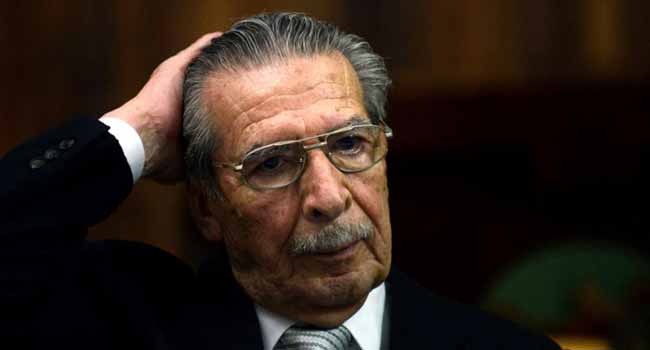
Efrain Rios Montt, a former military dictator who ruled Guatemala between 1982 and 1983 and who was facing retrial on genocide charges, died on Sunday aged 91, sources close to his family said.
One of his lawyers, Luis Rosales, told reporters that Rios Montt “died in his home, with the love of his family and a clear conscience.”
Rios Montt is accused of being responsible for the murders of 1,771 indigenous Ixil-Maya people during his short reign, which came at the height of a brutal 36-year civil war.
A May 2013 trial delivered a conviction and an 80-year sentence against Rios Montt — the first time a Latin American ex-dictator had been convicted of genocide.
But that verdict was overturned just days later by Guatemala’s constitutional court because of a “procedural error,” and a new trial was ordered.
That trial of Rios Montt and his spy chief, Jose Rodriguez, was halted in 2016 after an appeals court ruled each man should be tried separately.
Rios Montt’s lawyers sought to block further proceedings against their client, arguing his health was too poor and he suffered from dementia.
Denied charges
According to the UN, some 200,000 people died or were made to disappear during the Guatemala’s long, brutal civil war, which ended in 1996.
Rios Montt was accused of orchestrating an extermination policy against the indigenous population, which was perceived to be collaborating with left-wing guerrillas waging war against government forces.
He denied the charges in his original trial.
“I never authorized, never signed, never ordered an attack against a race, an ethnicity or a religion. I never did it!” he said at the time.
Short in stature and vigorous into old age, the former dictator had a humble beginning, with little to suggest a rise to national power.
He was born in Guatemala’s remote Huehuetenango province, near the border with Mexico.
He enlisted in the army as a teenager and rose through the ranks, receiving training courses at the US-run School of the Americas, where Latin American officers learned harsh tactics used in crackdowns on dissidents.
Politically, Rios Montt came to the forefront in 1974 when, as a brigadier general, he was put forward as a coalition presidential candidate.
Historians say he won an overwhelming victory, but electoral fraud prevented him from taking office. Another general, Kjell Eugenio Laugerud, took power instead.
As a consolation prize, Rios Montt was sent to Spain as the military attache.
US support
Upon returning home three years later, he turned away from Catholicism, his religion of birth, and became a fervent evangelical Christian.
On March 23, 1982, he took power in a bloodless coup, deposing Lucas Garcia.
During his 18-month rule, ruthless even by the standards of Latin American dictators, Rios Montt engaged in a “scorched earth” policy against dissidents, wiping out entire rural towns where leftists were suspected of living or having support.
He appointed so-called faceless judges who mounted summary trials and ordered numerous alleged criminals — often leftist rebel sympathizers or militants — executed.
Rios Montt also used his office to preach to his people: every Sunday night, dressed in a combat uniform, the dictator would take to the airwaves and talk about God, morality and politics.
He claimed in one such sermon that a “good Christian” lived their life “with a bible and a machine gun.”
As conflicts raged in nearby Nicaragua and El Salvador, then US president Ronald Reagan praised Rios Montt in 1982 as “a man of great personal integrity and commitment.”
Congressional immunity
But as evidence of gross human rights violations mounted, Rios Montt’s defense minister, General Oscar Mejia, ousted him from office in August 1983.
In 1989 Rios Montt founded the right-wing Guatemalan Republican Front (FRG), which reached national power with the election of Alfonso Portillo (2000-2004).
Portillo was arrested in 2010 on corruption charges and ended up being extradited to the United States, where he spent a little over a year in prison for money-laundering.
Rios Montt managed to avoid prosecution by entering Congress, where he enjoyed parliamentary immunity.
The ex-general served as a legislator between 1990 and 2003, including a stint as head of the chamber.
He also launched three unsuccessful presidential bids.
Courts blocked two of those attempts on grounds that he led a coup to take office, and by the time his lawyers won the right for him to run in 2003 his popularity had waned considerably.
When Rios Montt’s final term in Congress ended in 2012, along with his parliamentary immunity, he was slapped with charges of genocide and put under house arrest.
Comments
Post a Comment